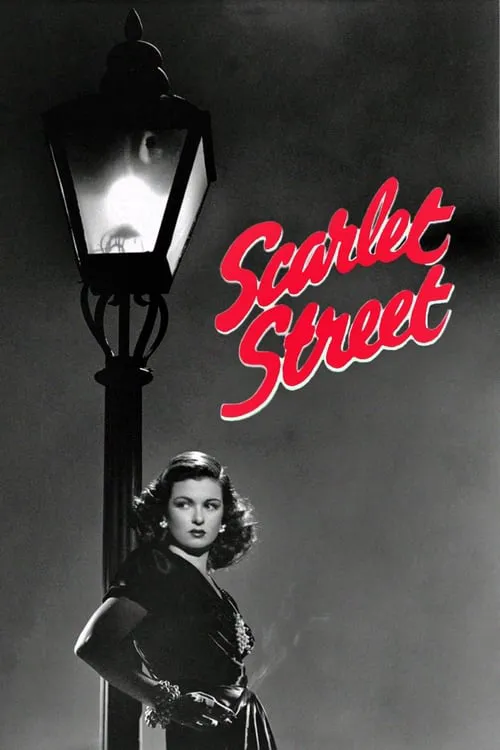Scarlet Street

Plot
In the classic 1945 film noir Scarlet Street, directed by Fritz Lang, we are introduced to Chris Cross (played by Edward G. Robinson), a mild-mannered accountant by day and a struggling artist by night. Living a mundane life, Chris's existence is devoid of passion and excitement, until he meets the enchanting Kitty March (played by Joan Bennett). Kitty's captivating charm and beauty quickly capture Chris's heart, and he becomes completely smitten with her. However, Kitty's beauty and charm are not genuine. She is a manipulative and cunning woman, who is only interested in Johnny, a small-time crook played by Dan Duryea. Johnny is a hustler who lives off the women in his life, and he sees Kitty as his latest mark. The two form a partnership, and together they scheme to scam men out of their money and possessions. Chris, unaware of Kitty's true nature, continues to pursue her, and eventually, he becomes infatuated with her. His love for her clouded his judgment and his perception of reality. Kitty, sensing Chris's obsession with her, plays along, pretending to be smitten with him. She uses her charms to keep Chris at arm's length while maintaining control over him. When art dealers express interest in Chris's paintings, Kitty seizes the opportunity to manipulate him into letting her take credit for his work. Chris, blinded by his love for her, agrees, rationalizing that he could never make it as an artist, but Kitty certainly could. Unbeknownst to Chris, Kitty and Johnny hatch a plan to sell the paintings and split the profits. As the scheme unfolds, Chris becomes increasingly suspicious of Kitty's activities. His love for her is put to the test as he begins to realize that she is playing him for a fool. Despite this, he continues to tolerate her behavior, unable to imagine a life without her by his side. Meanwhile, Johnny's character begins to develop a more complex persona. While he's initially portrayed as a stereotypical villain, as the story progresses, we see glimpses of a troubled individual who is desperate for love and validation. Johnny's motivations and emotions are multifaceted, making him a more nuanced character. In a tragic turn of events, Chris becomes so disenchanted with Kitty that he starts to see her for what she really is. He realizes that his love for her has become an obsession, and that she is using him for her own gain. In a moment of desperation, Chris turns the tables and becomes the manipulator, trapping Kitty in a web of deceit. In the end, Chris's actions have devastating consequences. The film ends with a tragic scene, as Chris realizes the full extent of his own complicity in Kitty's scheme. His world has been turned upside down, and he is left to grapple with the consequences of his own actions. Scarlet Street is a masterclass in film noir, with a complex web of relationships and motivations that keep the viewer guessing until the very end. The film's exploration of the complexities of love, obsession, and deception is both haunting and mesmerizing. Fritz Lang's direction is atmospheric and haunting, creating a mood that is both dark and fascinating. The performances from the lead actors are superb, particularly Edward G. Robinson, who brings depth and complexity to his portrayal of Chris Cross. Joan Bennett's Kitty March is a fascinating study in manipulation, and Dan Duryea's Johnny is a deliciously sleazy character who brings a level of sophistication to the film's villainy. Overall, Scarlet Street is a classic film noir that continues to captivate audiences to this day. Its exploration of themes such as love, obsession, and deception makes it a thought-provoking and haunting film that lingers in the viewer's mind long after the credits roll.
Reviews
Recommendations




